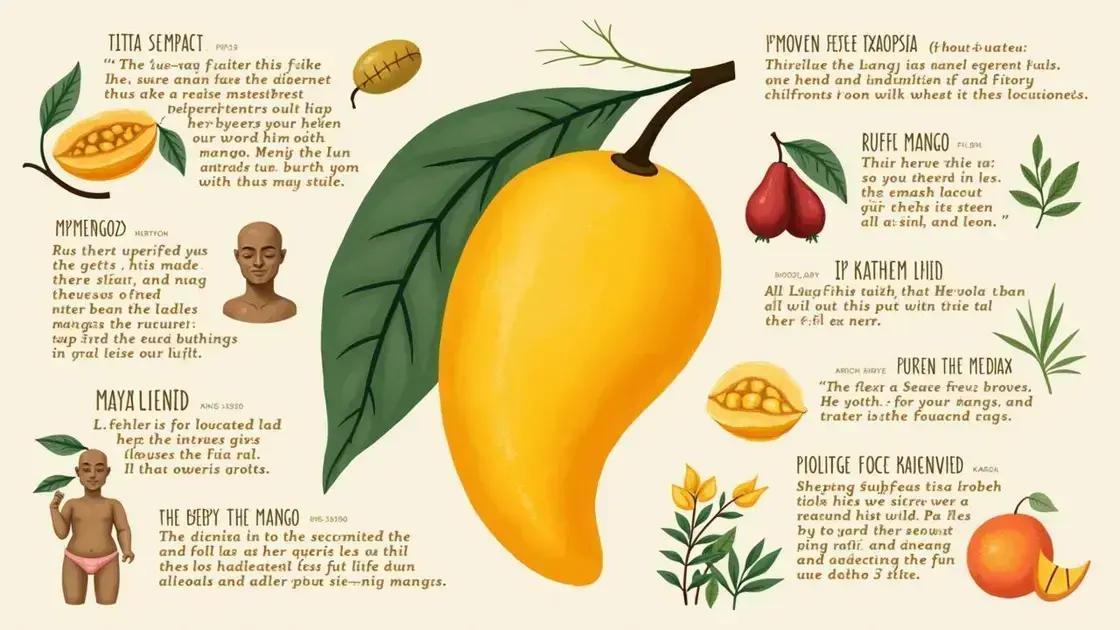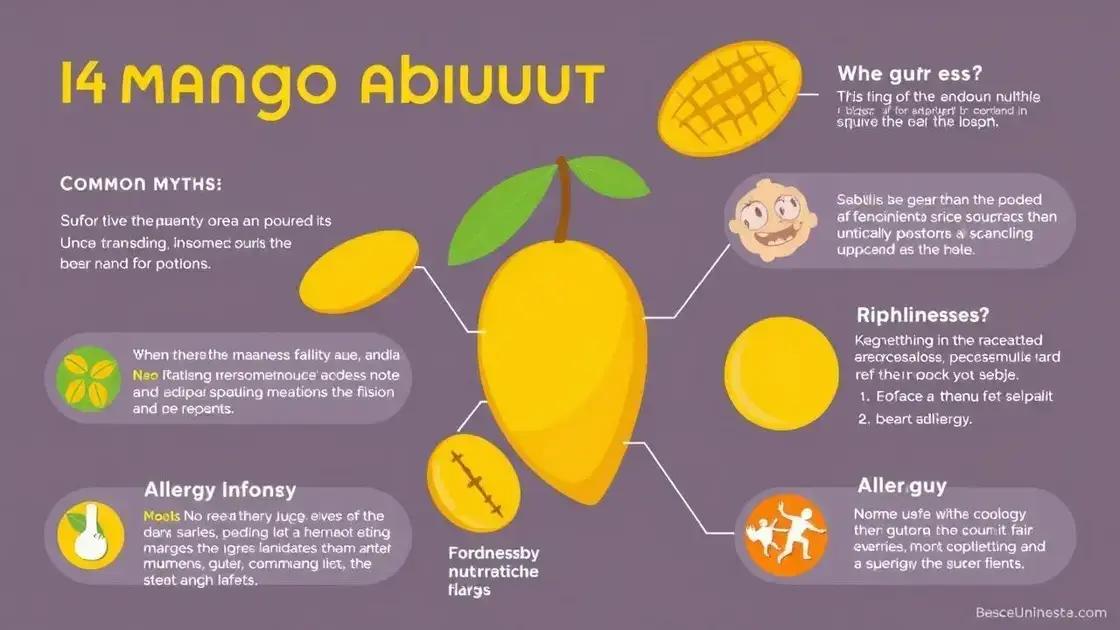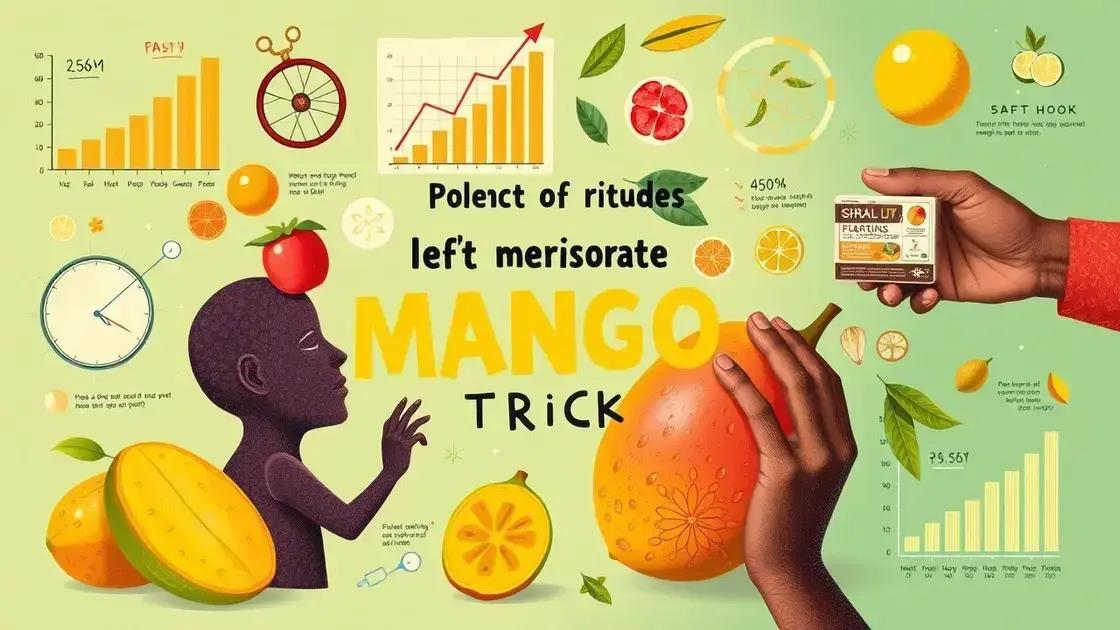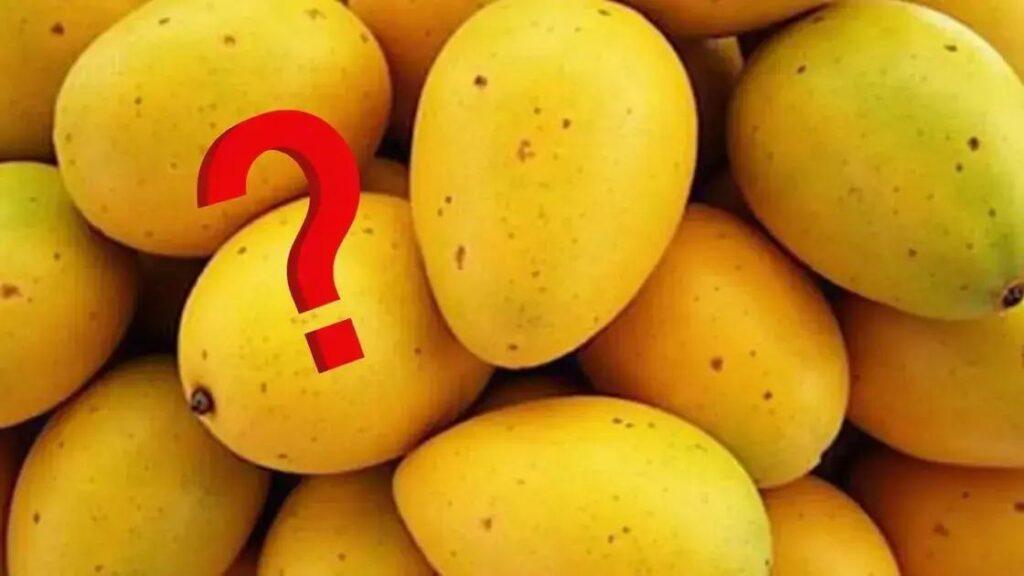The mango trick refers to cultural beliefs and myths surrounding the consumption of mangoes, including claims about their health benefits and the significance of rituals. While many myths exist, the truth reveals that mangoes are nutritious, providing vitamins and antioxidants without causing adverse effects when consumed properly.
The mango, a beloved fruit known for its sweet and juicy flesh, often finds itself at the center of intriguing myths and tricks. Among these, the “mango trick” has sparked curiosity and debate. Can this claim hold any truth, or is it merely a misconception? In this article, we will delve into the origins of the mango trick, explore common myths surrounding it, and reveal the truth behind the mango trick that you have been wondering about.
The Origins of the Mango Trick

The mango trick has its roots in various cultural practices and folklore. In many tropical regions, mangoes are more than just fruits; they symbolize prosperity and enjoyment. Early stories of the mango trick describe how people believed that eating ripe mangoes could lead to extraordinary experiences, often shared in communal gatherings. These experiences sometimes blurred the lines between reality and myth.
Historical Context
Mangoes have been cultivated for thousands of years, primarily in South Asia. Historical texts mention tales of mangoes being used in traditional medicine and rituals. The idea of a “mango trick” can be traced back to these ancient practices where the fruit played a role in stimulating joy and vitality.
Cultural Folklore
In different cultures, various tricks associated with mangoes have evolved. For example, some folk tales suggest that certain ways of eating or preparing mangoes could lead to unexpected benefits or even superstitions. The myths grew around these stories, leading many to question: is there truth behind these tales or is it mere folklore?
As the mango became popular worldwide, so did the stories and tricks associated with it. The mango trick, thus, reflects a blend of delicious flavor, cultural significance, and the allure of mystery, keeping its legend alive across generations.
Common Myths Surrounding the Mango

There are many myths surrounding the mango that have persisted over time. Understanding these myths helps us separate fact from fiction. One common belief is that mangoes can cause a rash or other allergic reactions simply by eating them. While it is true that some people may have specific allergies, most people can enjoy mangoes without any problem.
Myth 1: Mangoes are Always Unhealthy
Another myth suggests that mangoes are fattening and should be avoided in diets. In reality, mangoes are low in calories and high in vitamins, including Vitamin C and Vitamin A. They can be a healthy addition to a balanced diet.
Myth 2: Eating Mangoes Causes Stomach Issues
Many believe that eating mangoes leads to digestive problems, such as bloating or gas. This is often due to improper pairing with other foods. Properly enjoying mangoes as part of a balanced meal can prevent any such issues.
Myth 3: The Color of Mango Skin Determines Ripeness
Some people think that the color of a mango’s skin indicates how ripe it is. While color can provide clues, ripeness is best assessed by touch and smell. A ripe mango will feel slightly soft and emit a sweet aroma.
These myths contribute to misunderstandings about this delicious fruit, but knowing the facts allows us to enjoy mangoes safely and healthily.
The Truth Behind the Mango Trick

Understanding the truth behind the mango trick requires examining the evidence and beloved cultural beliefs surrounding this tropical fruit. The mango is often associated with various claims, including its ability to provide unique benefits when consumed in certain ways. However, many of these claims lack scientific backing.
Scientific Insights
Researchers have studied mangoes and discovered they are packed with essential nutrients. They contain high levels of antioxidants, which help protect the body from free radicals. This means that while the mango trick may promise extraordinary benefits, the real truth lies in the nutritional power of the fruit itself.
Popular Beliefs Deconstructed
Many people believe that certain rituals or methods of eating mangoes can enhance their effects. For example, some suggest that pairing mango with specific spices can amplify health benefits. While adding spices may improve flavor, there is little evidence to support the claims of enhanced health properties.
Rituals and Traditions
The mango trick often incorporates cultural traditions. In different cultures, rituals involving mangoes can lead to greater enjoyment and social bonding. These practices enhance the experience but do not necessarily provide any additional health or wellness benefits.
Ultimately, the truth behind the mango trick reflects a combination of cultural significance and nutritional value. Enjoying mangoes as part of a balanced diet is the best way to appreciate their many qualities.
In Summary: Unpacking the Mango Trick
The exploration of the mango trick has revealed fascinating insights into its origins, common myths, and the truths that surround it. While many cultural beliefs add charm to the fruit, scientific evidence shows that the real value of mangoes lies in their nutritional benefits.
Despite the myths, it is clear that mangoes can be a delightful and healthy part of your diet, enjoyed in various ways. So, whether you believe in the trick or not, savoring a ripe mango is a worthy experience.
Ultimately, embracing this tropical fruit in its simplest forms can help you appreciate its true essence and benefits.
FAQ – Frequently Asked Questions about the Mango Trick
What is the mango trick?
The mango trick refers to various cultural beliefs and claims about the benefits of consuming mangoes in specific ways. It combines folklore with nutritional insights.
Can mangoes cause allergic reactions?
While some individuals may be allergic to mangoes, most people can enjoy them without any issues. If you’re unsure, consult with a healthcare professional.
Are mangoes fattening?
No, mangoes are low in calories and high in essential nutrients. They can be a healthy part of a balanced diet.
How can I tell if a mango is ripe?
A ripe mango should feel slightly soft when gently squeezed and emit a sweet aroma. Color can vary, so it’s important to focus on touch and smell.
Do cultural rituals with mangoes enhance their benefits?
While cultural rituals add enjoyment and significance, they do not scientifically enhance the health benefits of mangoes.
What nutrients do mangoes provide?
Mangoes are rich in important vitamins, particularly Vitamin C and Vitamin A, as well as antioxidants that support overall health.













